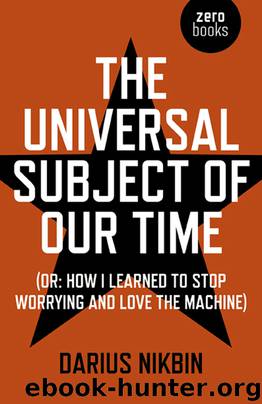The Universal Subject of Our Time by Darius Nikbin

Author:Darius Nikbin [Nikbin, Darius]
Language: eng
Format: epub
ISBN: 978-1-78904-041-8
Publisher: John Hunt Publishing
Published: 2019-02-21T16:00:00+00:00
The Unreal Realm of Our Collective Technopsychosis
The state of being totally detached from reality is what defines psychosis. According to our newly found understanding of subjectivity, are we today seeing ourselves collectively entering such a state of mind? After being divested of selfhood due to a technological overflow that has evacuated the human subject, the real world no longer bears any relevance to our being. The technological psychosis of the human self would be the result of an immersion in, excessive use of and reliance on silicon-based cognition devices. Whether there is a real danger of this happening or whether it has already happened to a significant extent, what is really needed now is a reality-check before things get too far out-of-hand. Where is this going to come from, before it is too late?
This drive towards the silicon realm is motivated by an apparent increase in our freedom and our capabilities in the virtual world. As human subjects, there must be something seemingly empowering about having the world of social connections and information at your fingertips. This, however, is not the human world; it is that of the mechan. This totally illusory sense of empowerment that technology has given us, once you take into account the subject of the machine and the future course of AI, shows that the excess in online activity is part of a collective Freudian organic death-drive as a species.
The death-drive theorised by the Austrian psychoanalyst Sigmund Freud suggested that a component of the human psyche dialectically opposes the drive towards life and survival. In other words, although we are beings-towards-life and the propagation of like, there is a part of us that instinctively seeks death. The very natural process of biological cell growth and decay in the body, therefore, extends in psychology to the entire human being. The death-drive can override that of life. Having entered technological psychosis, having invested our life-force into the expansion of silicon, what hope of escape from this whirling vortex of derangement do we have? Is post-modern apathy allowing us to be sucked into a black hole nexus between two indistinguishable mutually destructive forces? Or will a new found understanding allow us to reverse this bleak situation?
Nothing is real, since the virtual worlds we inhabit have replaced the real-world connections that we make, as in the film Tron (1982), the first to describe a world split between the real and virtual. Is this split or schizoid position the cause of today’s detachment from reality or technopsychosis? We are experiencing a pandemic of silicon-addiction right now. Could we even continue to speak of the supremacy of carbon-based lifeforms on Earth? As a result of the ghost in the machine, that of machine subjectivity, we have become surrounded and immersed, it seems, in evacuated silicon shells. The 1989 Japanese comic Ghost in the Shell (made into a Hollywood movie with Scarlett Johansen in 2017) creates a most extreme dystopian future for mankind. Here, technology has advanced so much that people possess cyber-brains, allowing them to biologically interface directly with various digital internet-like networks.
Download
This site does not store any files on its server. We only index and link to content provided by other sites. Please contact the content providers to delete copyright contents if any and email us, we'll remove relevant links or contents immediately.
| Computer Vision & Pattern Recognition | Expert Systems |
| Intelligence & Semantics | Machine Theory |
| Natural Language Processing | Neural Networks |
Algorithms of the Intelligent Web by Haralambos Marmanis;Dmitry Babenko(17650)
Jquery UI in Action : Master the concepts Of Jquery UI: A Step By Step Approach by ANMOL GOYAL(10069)
Test-Driven Development with Java by Alan Mellor(7753)
Data Augmentation with Python by Duc Haba(7628)
Principles of Data Fabric by Sonia Mezzetta(7402)
Learn Blender Simulations the Right Way by Stephen Pearson(7310)
Microservices with Spring Boot 3 and Spring Cloud by Magnus Larsson(7156)
Hadoop in Practice by Alex Holmes(6701)
RPA Solution Architect's Handbook by Sachin Sahgal(6533)
The Infinite Retina by Robert Scoble Irena Cronin(6241)
Big Data Analysis with Python by Ivan Marin(5959)
Life 3.0: Being Human in the Age of Artificial Intelligence by Tegmark Max(5545)
Pretrain Vision and Large Language Models in Python by Emily Webber(4916)
Infrastructure as Code for Beginners by Russ McKendrick(4676)
Functional Programming in JavaScript by Mantyla Dan(4515)
WordPress Plugin Development Cookbook by Yannick Lefebvre(4411)
The Age of Surveillance Capitalism by Shoshana Zuboff(4274)
Embracing Microservices Design by Ovais Mehboob Ahmed Khan Nabil Siddiqui and Timothy Oleson(4168)
Applied Machine Learning for Healthcare and Life Sciences Using AWS by Ujjwal Ratan(4156)
